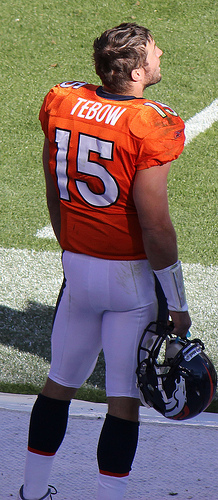“Football Freakonomics”: Tebow Timing
The following is a cross-post from NFL.com, where we’ve recently launched a Football Freakonomics Project. This segment aired before last Sunday’s Patriots-Broncos game.

Tebow at a game in Denver on October 30, 2011. (Photo:
One of the arguments both for and against Tim Tebow as a viable, long-term NFL starter is the idea that he should simply not be doing what he’s doing right now. Tebow’s critics say he’s getting far too much credit for his 7-1 record as a starter this season – that he’s benefiting from an unexplainable run of luck — while his supporters point to the exceptional performances he’s turned in immediately following those fortuitous bounces.
So how is a team that ranks second-to-last in passing yards, whose quarterback completes fewer than half his throws, pulling out miraculous victories week after week?
Four words: timing, luck, faith – and timing.
Let’s start with timing. Instead of focusing on Tebow’s completion rate, look at when he completes passes. He averages just 69 yards of passing during the first three quarters of games, but then 81.6 yards in each fourth quarter! His fourth-quarter passer rating is 111, third-best in the league; his rating in the last five minutes of games is a whopping 124.5.
Now onto the luck, or at least you’d call them big breaks. In Tebow’s first start, against the Dolphins, he rallied the Broncos from a 15-0 deficit in the final three minutes, a comeback made possible by the recovery of an onside kicks. Only 26 percent of onside kick attempts in the NFL are successful but Denver got one in Tebow’s first start, right when they needed it. You could say these Broncos have made a habit of bending fortune and statistics to their impressive will.
Consider the defense. During Tebow’s winning streak, the Broncos’ defense has allowed just 17 points per game. When Kyle Orton was starting? 28 per game. Now, a Tebow-run offense means keeping the ball on the ground – and keeping the ball longer, too: 31 minutes of possession per game since Tebow, versus 26 under Orton. Considering Tebow’s magic touch in the fourth quarter, those extra five minutes aren’t nothing.
And look at the Broncos’ kicker, Matt Prater. During the 7-1 streak, he’s gone only 12-for-17 for field goals but: like Tebow, he saves his best for last. Four of his 12 field goals were game-winners! His performance against the Bears was sick – joining Mike Vanderjagt as the only other man in NFL history to make a 50-plus-yarder to tie a game and another to win it in overtime.
And let’s not forget how Denver’s opponents have helped out: an inexplicable last-minute clock stoppage and an overtime fumble by Bears running back Marion Barber. The Chargers’ poor-play calling in overtime prior to their own missed field goal.
But after each of those miscues, Tebow calmly guided the Broncos down the field to score. A 95-yard drive against the Jets — the longest they’ve allowed all season, capped off by a 20-yard touchdown run. How rare is that? Out of more than 300 20-yard-plus rushes by quarterbacks over the past decade, only 3 – that’s 1 percent – were game-winning touchdowns. Tebow is the first quarterback in NFL history to engineer six fourth-quarter comebacks in his first 11 starts.
Now, the elite teams in the NFL don’t need those late-game heroics. Over the last eight games, the top five NFL teams have an average scoring differential of 102 points. The Broncos’ scoring differential over their past 8 games? Two points. That includes one loss, a 45-10 beating by Detroit – and a bunch of squeakers.
How have Tebow and his teammates beaten those odds? It depends on whom you ask. He may possess an unorthodox skill set for an NFL quarterback – but like the debate swirling around him – one thing he doesn’t lack, is passion.
And here’s one more thought. Tebow is hardly the first NFL quarterback to be demonstrative about his religious faith. But he’s very demonstrative – and it’s worth considering how that faith may affect his play. By definition, faith often translates into a kind of fearlessness. Tim Tebow doesn’t seem to be familiar with the phenomenon known as “fear of failure.” His belief – in himself, and in success – may be the intangible that lifts not only his own play, but of those around him.

Comments